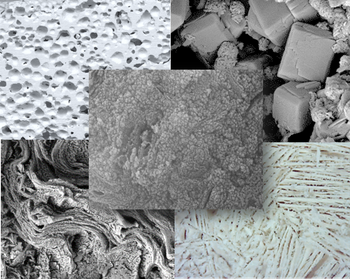GEopolymer based Adsorbents for effective adsorption and selective separation of CO2 and eutrophication pollutants
GEA

The GEA project addresses the development of synthetic alkaline aluminosilicates, i.e. geopolymers, for adsorption/separation/purification, clarifying when and why a geopolymer-based adsorbent may be preferred to a benchmark adsorbent. Geopolymers are low-cost materials, produced with respect for the environment: they are produced at low temperatures with a water-based synthesis from naturally abundant materials such as clays using a green chemistry approach; it is also possible to reuse geopolymers at the end of their life in other applications. The GEA project will implement a geopolymer platform with the ambition of linking the adsorption/desorption capacity and selectivity with respect to ionic species and gases to compositional and morphological "variables" such as: stoichiometry, phase composition and structural properties (directly linked to micro-macrostructure). By acting on the variables, the porosity, pore size/distribution and chemistry for the specific interaction will be appropriately modulated for the specific adsorption applications of the project, which are: 1) adsorption and separation of carbon dioxide in view of “Carbon Capture and Storage” (CCS); 2) removal of ammonium and phosphates from wastewater with the aim of preventing eutrophication and recovery of critical raw materials (recovery and separation of phosphorus).

The results of the GEA project will open up the possibility of customizing eco-compatible materials (low energy process) for specific adsorptions and identifying geopolymeric matrices capable of actively increasing the performance of other adsorbents such as zeolites, apatites, hydrotalcites in composites. Furthermore, the results of the project will finally clarify the real potential, even on a large scale, of geopolymer-based adsorbents compared to benchmark adsorbents. It follows that the impacts of this project in the field of solid state adsorption will be:
- scientifically relevant as the project will overcome the main bottleneck that hinders the wider use of geopolymer adsorbents, namely the reproducibility of results also relating to raw materials and processing, and the gap between research studies, which they often use unrealistic scenarios (e.g. synthetic wastewater) compared to real ones, which are much more complex;
- technologically relevant as the use of geopolymers allows the shape of the adsorbent solid to be easily customized to the separation plant and increases the mechanical performance and durability over time. - economically relevant because the synthesis of geopolymers can be performed with a fairly low energy input.
Progetto PRIN: PROGETTI DI RICERCA DI RILEVANTE INTERESSE NAZIONALE – Bando 2022. Prot. 20229THRM2
UNIBO research team
Project partners
CNR-ISSMC Istituto di Scienza, Tecnologia e Sostenibilità per lo Sviluppo dei Materiali Ceramici